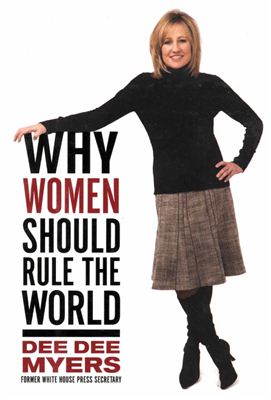Harper Collins Publishers, 2008, ISBN: 0061140406, 280 pages
What would happen if women ruled the world?
Everything could change, according to former White House press secretary Dee Dee Myers. Politics would be more collegial. Businesses would be more productive. And communities would be healthier. Empowering women would make the world a better place—not because women are the same as men, but precisely because they are different.
Blending memoir, social history, and a call to action, Dee Dee Myers challenges us to imagine a not-too-distant future in which increasing numbers of women reach the top ranks of politics, business, science, and academia.
Reflecting on her own tenure in the Clinton administration and her work as a political analyst, media commentator, and former consultant to NBC's The West Wing, Myers assesses the crucial but long-ignored strengths that female leaders bring to the table. "Women tend to be better communicators, better listeners, better at forming consensus," Myers argues. In a highly competitive and increasingly fractious world, women possess the kind of critical problem-solving skills that are urgently needed to break down barriers, build understanding, and create the best conditions for peace.
Myers knows firsthand the responsibilities and rewards of taking on leadership roles traditionally occupied by men. At thirty-one, she was appointed White House press secretary to President Bill Clinton—the first woman ever to hold the job. In a candid look at her years in Washington's political spotlight, she recalls the day-to-day challenge of confronting a press corps obsessed with more than just the president's policies. "Virtually every story written about me included observations about my earrings, my makeup, my clothes, my shoes. And then there was my hair."
Recalling the pressures—both invited and imposed—of her West Wing years, Myers offers a hard-hitting look at the challenges women must overcome and the traps they must avoid as they travel the path toward success. From pioneering research in the laboratory, to innovations in business, entertainment, and media, to friendships that transcend partisanship in the U.S. Senate, she describes how female participation in public life has already transformed the world in which we live.
What would happen if women ruled the world?
Everything could change, according to former White House press secretary Dee Dee Myers. Politics would be more collegial. Businesses would be more productive. And communities would be healthier. Empowering women would make the world a better place—not because women are the same as men, but precisely because they are different.
Blending memoir, social history, and a call to action, Dee Dee Myers challenges us to imagine a not-too-distant future in which increasing numbers of women reach the top ranks of politics, business, science, and academia.
Reflecting on her own tenure in the Clinton administration and her work as a political analyst, media commentator, and former consultant to NBC's The West Wing, Myers assesses the crucial but long-ignored strengths that female leaders bring to the table. "Women tend to be better communicators, better listeners, better at forming consensus," Myers argues. In a highly competitive and increasingly fractious world, women possess the kind of critical problem-solving skills that are urgently needed to break down barriers, build understanding, and create the best conditions for peace.
Myers knows firsthand the responsibilities and rewards of taking on leadership roles traditionally occupied by men. At thirty-one, she was appointed White House press secretary to President Bill Clinton—the first woman ever to hold the job. In a candid look at her years in Washington's political spotlight, she recalls the day-to-day challenge of confronting a press corps obsessed with more than just the president's policies. "Virtually every story written about me included observations about my earrings, my makeup, my clothes, my shoes. And then there was my hair."
Recalling the pressures—both invited and imposed—of her West Wing years, Myers offers a hard-hitting look at the challenges women must overcome and the traps they must avoid as they travel the path toward success. From pioneering research in the laboratory, to innovations in business, entertainment, and media, to friendships that transcend partisanship in the U.S. Senate, she describes how female participation in public life has already transformed the world in which we live.

